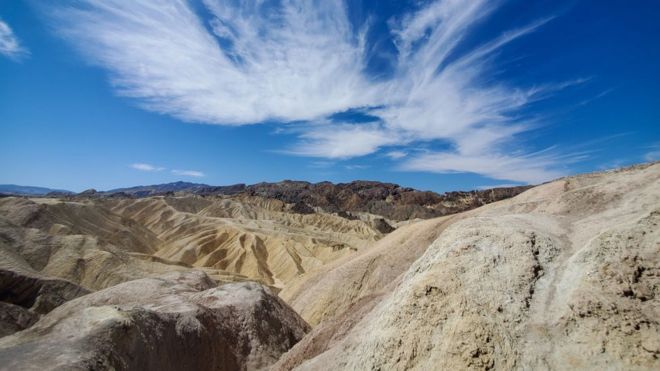What could be the highest temperature ever reliably recorded on Earth - 130F (54.4C) - has been reached in Death Valley National Park in California.
The recording is being verified by the US National Weather Service.
It comes amid a heatwave on the US's west coast, where temperatures are forecast to rise further this week.
The scorching conditions have led to two days of blackouts in California, after a power plant malfunctioned on Saturday.
Sunday's reading was recorded in Furnace Creek in Death Valley.
Before this, the hottest temperature reliably recorded on Earth was 129.2F (54C) - also in Death Valley in 2013.
A higher reading of 134F, or 56.6C a century earlier, also in Death Valley, is disputed.
It is believed by some modern weather experts to have been erroneous, along with several other searing temperatures recorded that summer.
According to a 2016 analysis from weather historian Christopher Burt, other temperatures in the region recorded in 1913 do not corroborate the Death Valley reading.
Another record temperature for the planet - 131F, or 55C - was recorded in Tunisia in 1931, but Mr Burt said this reading, as well as others recorded in Africa during the colonial era, had "serious credibility issues".
The current heatwave stretches from Arizona in the south-west, up the coast to Washington state in the north-west.
It is expected to hit its peak on Monday and Tuesday, before temperatures start to drop later in the week. However, the sweltering heat will continue for at least another 10 days.
As temperatures soared in California, a large "firenado" was observed on Saturday in Lassen County.

California's Independent System Operator (CISO), which manages the state's power, has declared a Stage 3 Emergency, meaning "when demand [for electricity] begins to outpace supply".
Because so much of the region's power relies on solar and wind energy, and because people use their electricity for air conditioning, during heatwaves the power grid becomes strained and is at risk of completely malfunctioning.
In order to manage the state's demand for power and prevent a complete shutdown, officials are using scheduled rolling blackouts to control and conserve energy.
Latest Stories
-
Prof. Nana Ama Browne Klutse: Championing environmental sustainability and youth employment in Ghana
1 hour -
Ablekuma North rerun: ‘I was only there to de-escalate the situation’ – Mustapha Gbande
2 hours -
I was once a footballer – Socrate Safo reveals
2 hours -
See the blackout areas as ECG’s planned maintenance proceeds today
3 hours -
Democracy advocacy group condemns Ablekuma North violence
3 hours -
Club World Cup final: How Chelsea, PSG compare; who will win?
4 hours -
How hundreds of Irish babies came to be buried in a secret mass grave
4 hours -
Embrace rural postings to address shortage – Dr Apaak urges teachers
4 hours -
Professor Gyampo exposes shipping lines over “arbitrary” exchange rates
4 hours -
Chief Justice’s ECOWAS court battle divides legal minds
4 hours -
Over 70,000 trained health graduates remain unemployed
6 hours -
Minority demands urgent aid for Ghanaian scholarship students facing deportation
6 hours -
Mahama pledges accountability for $10 billion “Big Push” funded by oil revenue
7 hours -
Mahama lands in Malabo for critical AU mid-year summit
8 hours -
Chief Justice’s ECOWAS court action sparks accountability debate
8 hours

